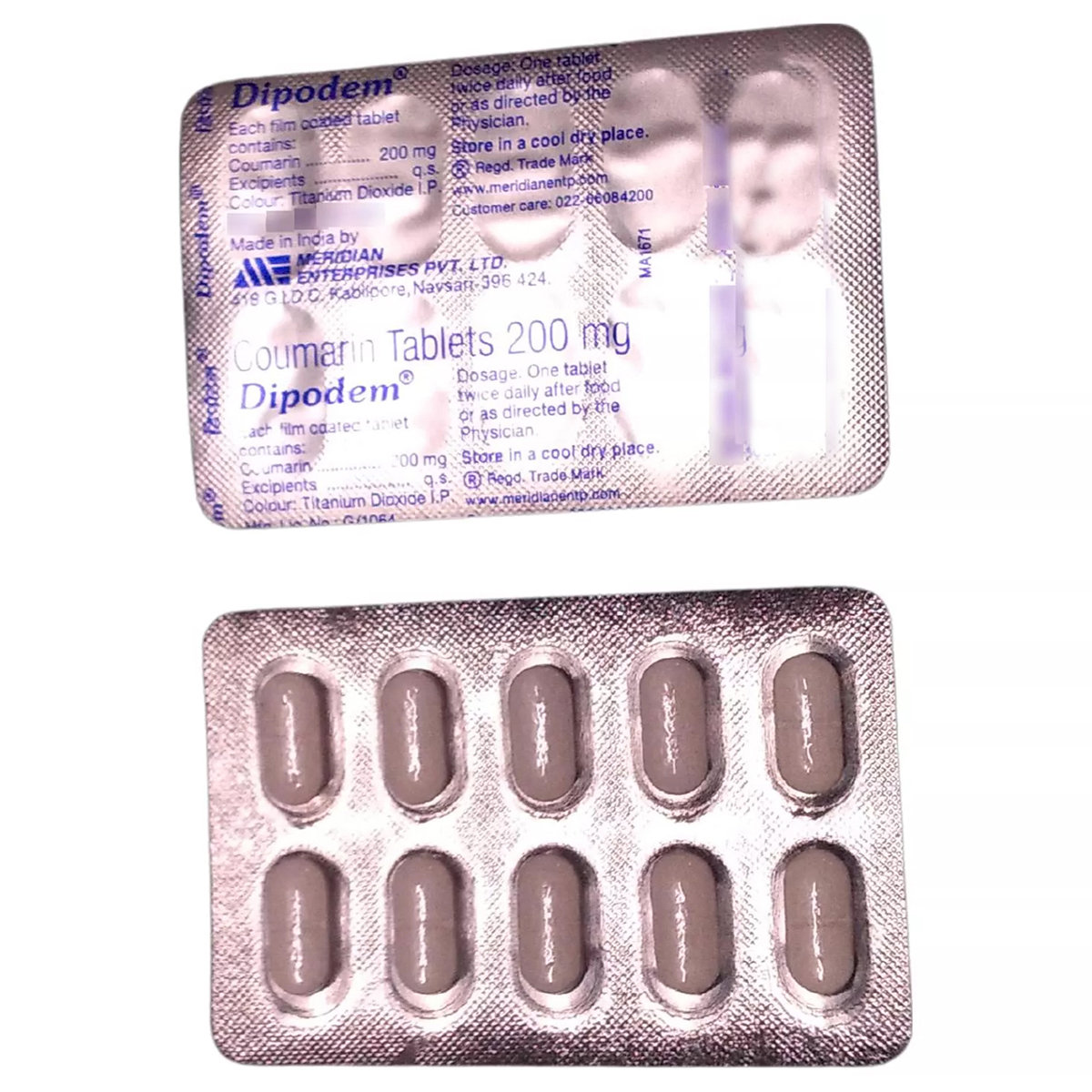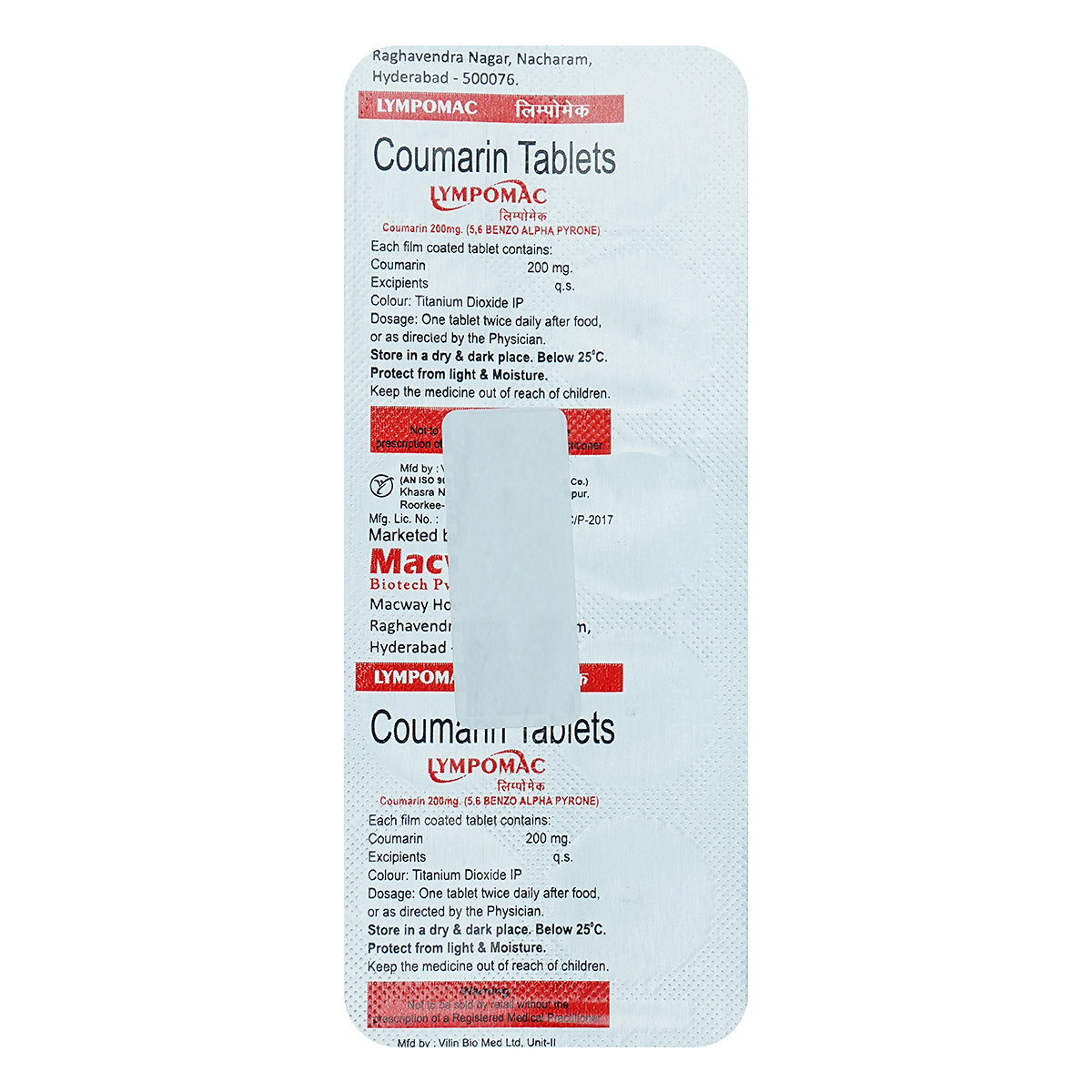Coumarin
About Coumarin
Coumarin is used in the treatment of inflammation and oedema. It reduces swelling, prevents numbness, relieves pain, and improves mobility. Also, it has anticoagulant properties and helps prevent the formation of blood clots and improve blood flow. It is used in the treatment of deep vein thrombosis (blood clots in leg veins) and pulmonary embolism (blood clots in the lung).
Coumarin contains Coumarin which restores lymphatic function and speeds up wound healing. Also, it helps to maintain healthy blood flow and prevents the formation of blood clots.
Take Coumarin as prescribed by your doctor. Your doctor will decide the dose and duration based on your medical condition. If you experience any side effects, please consult your doctor.
If you are allergic to Coumarin or any other medicines, please tell your doctor. Coumarin is not recommended for children unless advised by a doctor. If you are pregnant or breastfeeding, inform your doctor before taking Coumarin. Drive only if you are alert after taking Coumarin.
Uses of Coumarin
Medicinal Benefits
Coumarin contains coumarin, an Immuno Stimulant Anti-Inflammatory Drug. It reduces oedema (swelling caused by fluid accumulation in the body's tissues) and promotes healing. Coumarin has various pharmacological properties, including anti-inflammatory, anti-cancer, anticoagulant, antimicrobial, neuroprotective, antidiabetic, anticonvulsant and antiproliferative. It is highly used in cases of sprains and bruises, injuries, contusions, fractures, post-operative oedema and haematoma, lymphedema, dental extractions, mastectomy, acute and sub-acute lymphangitis, and chronic venous sufficiency.
Directions for Use
- Coumarin can be taken with or without food, or as advised by a doctor.
- Follow your doctor's instructions regarding dosage and timing for better effectiveness.
- Swallow Coumarin as a whole with a glass of water.
- Do not crush, chew, or break it.
Storage
Side Effects of Coumarin
If you experience any side effects, please consult your doctor.
Medicines Containing this Salt
View AllDrug Warnings
If you are allergic to Coumarin or any other medicines, please tell your doctor. Coumarin is not recommended for children unless advised by a doctor. If you are pregnant or breastfeeding, inform your doctor before taking Coumarin. Drive only if you are alert after taking Coumarin.
Drug Interactions
Drug-drug interactions: If you take prescription or non-prescription medicines or supplements, inform your doctor before taking Coumarin.
Drug-food interactions: No interactions found.
Drug-disease interactions: If you have any medical conditions, inform your doctor before taking Coumarin.
Drug-Drug Interactions Checker List:
Safety Advice

Alcohol
consult your doctorThe interaction of Coumarin with alcohol is unknown. If you have any concerns, discuss them with your doctor.

Pregnancy
consult your doctorIf you are pregnant or planning pregnancy, please consult a doctor before taking Coumarin.

Breast Feeding
consult your doctorIf you are a breastfeeding mother, please inform your doctor before taking Coumarin.

Driving
consult your doctorDrive only if you are alert after taking Coumarin. If you have any concerns about driving after taking Coumarin, please discuss them with your doctor.

Liver
consult your doctorIf you have any liver problems, inform your doctor before taking Coumarin.

Kidney
consult your doctorIf you have kidney problems, inform your doctor before taking Coumarin.

Children
consult your doctorIf you have any concerns regarding the use of Coumarin for children, please consult a doctor.
Habit Forming
Diet & Lifestyle Advise
- Include anti-inflammatory foods such as green tea, broccoli, berries and cherries, avocados, mushrooms (shiitake, portobello), turmeric, clove, ginger, tomatoes, and fatty fish (mackerel, salmon).
- Regular exercise helps dissolve blood clots, especially in obese people.
- Avoid consumption of alcohol and quit smoking.
Patients Concern
Disease/Condition Glossary
Inflammation: It is a normal part of the body's response to infection or injury. Inflammation occurs when the body releases chemicals to fight off infection or repair damaged tissue. The symptoms include redness, swelling, heat and pain.
Oedema: It is swelling caused by fluid retention and typically affects the ankles, legs, or feet. However, it can also affect face, hands, or any other body area.
Deep vein thrombosis: It is a medical condition in which blood clots form in deep veins, usually in the legs. The symptoms include leg pain or swelling.
Pulmonary embolism: It is a condition that occurs as the blood clots break and travel to the lungs from deep veins in the legs or other parts of the body. The symptoms of pulmonary embolism include chest pain, cough and shortness of breath. Quick medication is advised to reduce the risk of serious conditions due to blood clots.
FAQs
Coumarin is used in the treatment of inflammation and oedema. It reduces swelling, prevents numbness, relieves pain, and improves mobility. Also, it has anticoagulant properties and helps prevent the formation of blood clots and improve blood flow.
Coumarin contains Coumarin, which restores lymphatic function and speeds up wound healing. Also, it helps to maintain healthy blood flow and prevents the formation of blood clots.
You are not recommended to stop taking Coumarin without consulting your doctor as it may worsen the condition. Therefore, take Coumarin for as long as your doctor has prescribed it. However, if you experience any difficulty while taking Coumarin, please consult a doctor.
If you exceed the recommended dose of Coumarin, it may increase the risk of bleeding. Do not take excessive doses and always stick to the recommended dose as prescribed by your doctor.
Take Coumarin exactly as prescribed by your doctor. Swallow it as a whole with a glass of water. Do not crush, chew, or break it.
If you are pregnant or breastfeeding, please consult your doctor before taking Coumarin. The doctor may suggest Coumarin if the benefits outweigh the risks.
It is not recommended to take other medicines along with Coumarin unless prescribed by your doctor. If you take prescription or non-prescription medications or supplements, inform your doctor before taking Coumarin.
Coumarin should be stored in a cool and dry place away from sunlight and kept away from children’s reach.
Generally, Coumarin doesn’t have any potential side effects. However, if you suspect any side effects while using it consult your doctor immediately.



